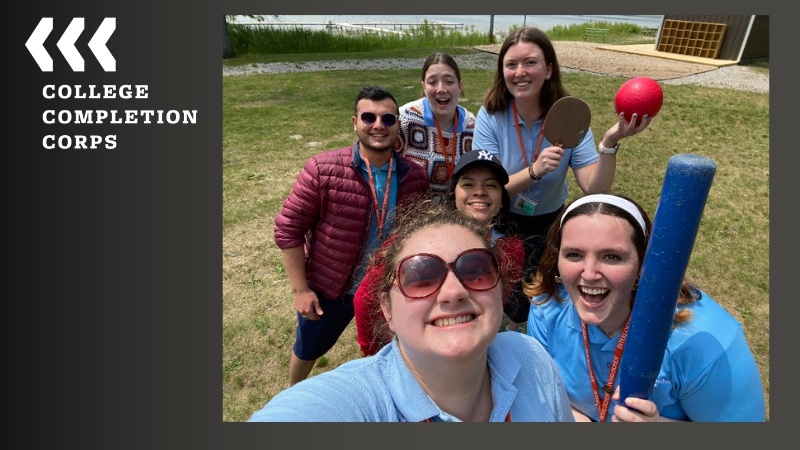
Photo: Madison and fellow camp counselors pose for a photo during prep-week.
College Completion Corps is an AmeriCorps program that seeks to increase the number of community and tribal college students who complete a certificate, an associate degree, or successfully transfer to a four-year university. College completion coaches serve on campuses that serve a significant number of low-income, first-generation college-going students. I have been serving for five months at Northwestern Michigan College in Traverse City.
As college completion coaches, we often find ourselves attempting to help our students answer larger life questions. For Madison, it was, "Where am I going to go?" This 20-year-old independent student was dreading the end of the semester, knowing she had nowhere to go when the dormitory closed for the summer.
A domestic situation had forced her out of her home during high school. Counselors and administrators from her school helped her find temporary housing in a motel, provided money for food and gas, and supported her in and out of the classroom. When Madison enrolled at NMC, she found her once strong support system waning. She realized she would have to support herself. Madison received grants to cover the cost of tuition and supplies, but she began to rack up student loan debt to pay for her living space. The lingering effects of past traumas, the fear of not having a support system, and the everyday difficulties of her studies were weighing on her.
Madison told me that she wasn’t going to continue with her studies, as her student debt racked up and she felt increasingly hopeless. I quickly got to work, learning more about the college and community resources. Navigating the space of off-campus organizations was stressful for me. I simply could not imagine being young and scared and trying to navigate the system to find aid in a time when I was facing housing insecurity.
A call to our Northwest Michigan Community Action Agency helped us to understand what options were available. I helped Madison complete the intake form for the Goodwill Inn, a local shelter for people who are homeless. She was given an officer assignment through the agency and was placed into the group setting of the Goodwill Inn. Although this was a solution, it was not a permanent one. Knowing Madison's interest in early childhood education, I suggested that finding a job at a residential summer camp could solve a few problems at once. At a Northwestern Michigan College Career Fair, I connected with an area performing arts school with a summer camp program. I worked with Madison to brush up her resume, craft a cover letter, apply for the job, and do interview prep.
She was hired for the summer camp position, which helped her grow in confidence. In our meetings after the interview, she shared ideas of how to create lasting memories for her campers. Fueled with this newfound optimism, she decided to take a leap of faith and re-enroll in her early childhood courses for the upcoming fall semester. I check in with her weekly, and today, when asking how camp was going, she said, "I have never been so happy in my entire life." She is safe. No worries about a roof over her head or food to eat. She is earning income that will help sustain her during her next and final year at NMC as she finishes her degree in early childhood education.
As coaches, we aren't just there to talk about school and help with coursework. We are there to meet the needs of the whole person. All Madison needed was a listening ear, a creative problem solver, a confident networker, and a caring advocate to help navigate the uncharted waters of homelessness and turn her outlook into opportunity and hope! As a College completion coach through AmeriCorps and Michigan College Access Network, that is my role. I cannot wait to hear all the stories from her summer, but even moreso, I cannot wait to see her graduate and achieve her goals.
As college completion coaches, we often find ourselves attempting to help our students answer larger life questions. For Madison, it was, "Where am I going to go?" This 20-year-old independent student was dreading the end of the semester.